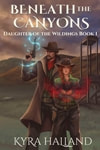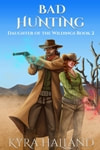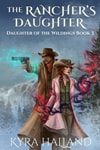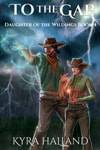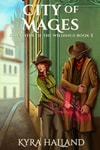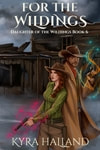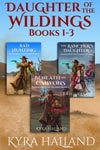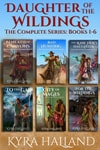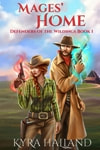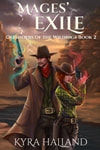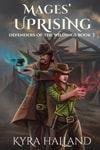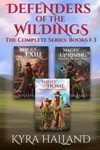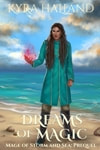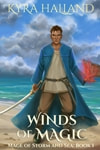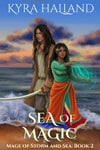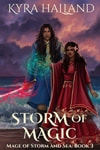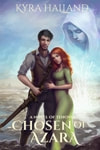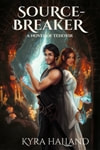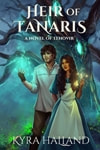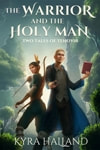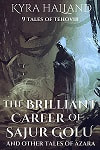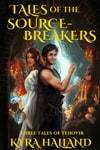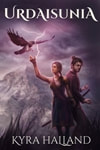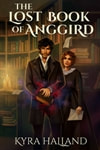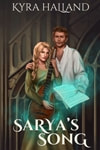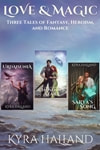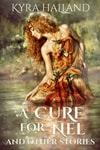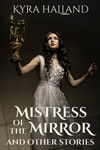|
Today's Camp NaNo output:
1517 words Total: 5234/30,000 words. Have I mentioned how much fun this series, Daughter of the Wildings, is to write? Aside from the issue of it not wanting to let me plan more than a few scenes or chapters in advance, which is completely different from how I usually write. The setting and the characters are so much fun, and I'm finding myself leaving places where I can write short stories and novellas later on to fill in some gaps. The world needs more second-world fantasy (that is, fantasy set in a world completely unconnected to ours) in a wild west type of setting. Anyway. I realized I haven't written anything about Urdaisunia lately. It's published, it's out there, and I've moved on to other projects. But I haven't forgotten about it. There's a story behind the writing of Urdaisunia, and here it is. A long time ago, I wrote my first novel. Like a good little writer, I then found an agent in the Writers Marketplace book at the library, and bundled my novel off to an agent who represented fantasy writers. Then I started my next novel. There were two seeds for this second novel. One was an image that came into my mind, of a peasant woman, destitute and desperate, facing down three men on horseback who were holding swords over her head. Then one of the men, obviously in charge of the other two, orders them, in a language she doesn't understand, to not kill her. The other seed was my fascination at the time (well, I still have it) with very ancient civilizations and cultures. Not the Romans and Greeks, those whippersnappers, but even more ancient. And not the Egyptians, because that's been done. I wanted really, really ancient, and something that you didn't see stuff about all the time. Sumeria fit the bill. I read up about the technology and culture developed by the Sumerians, and their literature and mythology, and began developing a world based on that. You can find more details about the Sumerian influences on Urdaisunia in this post. Then I plopped that peasant woman and the three warriors down in that world, and came up with the idea of an ancient, proud civilization in decline and conquered by newcomers, and the gods of that civilization all in an uproar about what to do about it. I started writing that novel and was having loads of fun with it. In the meantime, I got a response from the literary agency I had contacted, a very nice rejection that made me feel like maybe I would hit the target with the next book. Also in the meantime, though, the word "marketability" had entered my awareness. Whether through reading Writer's Digest magazine, or something in the letter from the agency, or both, I don't remember. But at that point, I realized that I was not only going to have to write something good, I was also going to have to write something that an agent would find marketable and that the agent would be able to convince an editor at a publishing company was marketable. And then I froze up. I had no idea what someone else was going to think was marketable - I still don't. I don't know if anyone does. All I knew was that I had never seen anything like the novel I was writing on the fantasy shelves at bookstores (pre-Medieval, non-European setting, no wizards and magic, all these gods running around doing their soap opera thing), which said to me that books like that were not considered marketable. I mean, I couldn't be the only person who ever thought of writing something like that. So I tried to change the story. I stuck some wizard and magic stuff (beyond the small amount that came organically) into the story and tried to make the whole thing with the gods a little less weird, and just tried to make the whole structure of the novel more like that of the fantasy novels I was reading at the time. The more I tried to make the novel "marketable," the bigger mess it turned into, and finally I just gave up - both on the novel and on the idea of trying to get published, since it was now apparent to me that I didn't have a clue about how to write the kinds of things that agents and publishers would want. This was in about 1991. Fast forward to, oh, 2005, 2006, or so. Those characters - the peasant-rebel woman, the hapless prince, the scheming gods, wouldn't leave me alone. So I dug into my old story files and hauled out my old printouts, gave the first few chapters a quick edit, and started posting them on my old fiction website, with the intent of writing and posting the rest of it one chapter at a time. How did that work out? About as well as you'd expect it to. I had a mishmash of the different old versions I'd tried writing, plot threads that went nowhere, and no clue how I wanted it to work out at the end. So I chucked the whole idea again. But those darn characters STILL wouldn't leave me alone. So in, hmm, early 2010, on a creative high after completing my first National Novel Writing Month challenge, I hauled out all my old notes and files and printouts, plopped whatever was salvagable into a Liquid Story Binder project, and patchworked together a complete manuscript from usable old bits and newly-written material. It felt really good to finally reach The End on the novel I'd started nearly twenty years earlier. There was just one problem, though. It was awful. Between my execrable "high fantasy" narrative style from when I first started writing, and the "let's just get this over with" brain dumps in the new stuff, and the random bits of deleted characters and subplots still lying around, it was a huge mess. I figured that one day I would tackle it and make something out of it, but I had no idea how. And then I discovered Holly Lisle's How To Revise Your Novel online course. It sounded good, and I was gearing up to dive into the world of self-publishing and wanted to get the editorial skills to be able to make my books as good as I could, so I signed up. The project I chose to do the course with was that thrice-abandoned mess, Urdaisunia. I figured if the method taught in the course could make something readable out of that thing, then it could work on any book. The course has five months worth of lessons, but it took me longer than that to get all the way through all the work. It was hard - just reading my rough draft made my eyeballs bleed at times, and I had to dig down really deep to find the really cool story that lay buried far beneath the surface. But I did it, I tore that thing apart, pulled out and dusted off what was good and got rid of the bad, and put it all back together again. When I finally finished the first revision, I sent my vastly improved story out to some friends who bravely agreed to test-read it for me, did another big revision based on their feedback and some more ideas I'd had about the story, and then, when all that was done, realized I had a novel I was proud of. And, well, the rest is history. I did the final edits, formatted it, and now that story I abandoned long ago as being a hopeless cause is now out there, on Amazon and in paperback and everything (in theory, you can even go to your favorite bricks&mortar bookstore and special-order it). It's an incredible feeling. And Rashali and Eruz and all those bickering gods are much, much happier with me now.
0 Comments
Your comment will be posted after it is approved.
Leave a Reply. |
AuthorI am Kyra Halland, author of tales of fantasy, heroism, and romance. Sign up for my email list
My Books
More Books
Click on the covers for more information
Categories
All
Archives
April 2024
Kyra Halland: Welcome to My Worlds is a participant in the Amazon Services LLC Associates Program, an affiliate advertising program designed to provide a means for sites to earn advertising fees by advertising and linking to amazon.com.
Other links on this site may also lead to products for which the owner may receive compensation. This website uses marketing and tracking technologies. Opting out of this will opt you out of all cookies, except for those needed to run the website. Note that some products may not work as well without tracking cookies. Opt Out of Cookies |
 RSS Feed
RSS Feed
